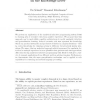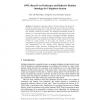299 search results - page 15 / 60 » Using Behavioral Knowledge for Situated Prediction of Moveme... |
CEEMAS
2005
Springer
15 years 5 months ago
2005
Springer
Abstract. An autonomous agent may largely benefit from its ability to reconstruct another agent’s reasoning principles from records of past events and general knowledge about th...
92
Voted
COGSR
2011
14 years 6 months ago
2011
We present an application of the analytical inductive programming system Igor to learning sets of recursive rules from positive experience. We propose that this approach can be us...
138
click to vote
AAAI
2012
13 years 2 months ago
2012
Real-world AI systems have been recently deployed which can automatically analyze the plan and tactics of tennis players. As the game-state is updated regularly at short intervals...
OTM
2005
Springer
15 years 5 months ago
2005
Springer
In ubiquitous computing, behavior routine learning is the process of mining the context-aware data to find interesting rules on the user’s behavior, while preference learning tri...
GIS
2006
ACM
14 years 11 months ago
2006
ACM
Geospatial data is often used to predict or recommend movements of robots, people, or animals ("walkers"). Analysis of such systems can be combinatorially explosive. Eac...


